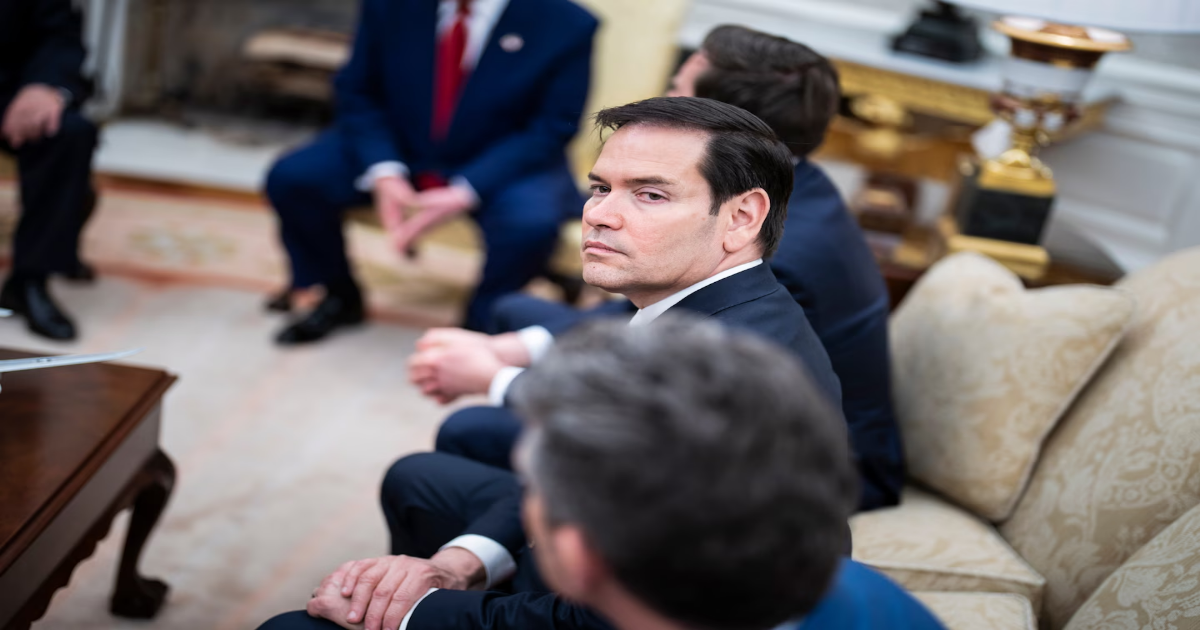Secretary of State Marco Rubio unveiled a plan Tuesday to significantly reorganize the State Department, saying the redesign would reverse “decades of bloat and bureaucracy.”
The proposed shake-up of America’s primary foreign policy institution coincides with the Trump administration’s efforts to reorient the United States on the world stage to align with the president’s “America First” agenda while cutting costs and downsizing staff.
The effort targets some human rights programs and others focused on war crimes and democracy, according to internal documents shared with The Washington Post. As part of the plan, senior officials would submit a path to reducing U.S.-based staff by 15 percent, according to the documents, potentially affecting hundreds of jobs.
A new Bureau of Emerging Threats would be created to focus on cybersecurity and the proliferation of artificial intelligence, among other areas, the document stated. The proposed bureau would represent a rare focus on expanding the department’s capacity.
On Tuesday morning, the State Department also sent its reorganization plans to the Senate Foreign Relations Committee and the House Foreign Affairs Committee, which provide oversight of the department. Lawmakers in both parties have raised concerns about major changes to congressionally mandated programs and agencies that the Trump administration has signaled it wants to revamp or outright delete.
This plan includes the elimination of 132 offices and 700 positions, said a congressional aide who reviewed the documents. Many others would be transferred or “reorganized,” though such changes were not clearly explained and left unanswered questions about how the proposed shake-up would functionally alter things, the aide said. This person, like some others, spoke on the condition of anonymity to discuss the proposal.
In an email to staff, Deputy Secretary of State Chris Landau said implementation would be led by an internal working group that would come up with “thoughtful plans” on adopting the changes by July 1.
In a post on social media, Rubio said, “Region-specific functions will be consolidated to increase functionality, redundant offices will be removed, and non-statutory programs that are misaligned with America’s core national interests will cease to exist.” He did not specify which ones.
Within the State Department, conjecture has swirled for weeks about the likelihood of significant staff reductions and drastic shifts in institutional priorities. In group chats and private messages, current and former officials have circulated screenshots of documents and other speculation, hoping to understand what would happen next and how many jobs could be implicated.
Some diplomats and officials who are worried about the scale of reforms were heartened to learn this month that Pete Marocco, a senior official who had led the dismantling of the U.S. Agency for International Development (USAID) in conjunction with tech billionaire Elon Musk’s DOGE Service, had left the department after reported clashes with Rubio.
Even so, it has long been clear that the Trump administration plans major changes — and significant reductions — to the State Department. The question was not whether cuts would happen, but how big they would be.
One document purporting to be a draft executive order, widely circulated among current and former officials over the weekend, outlined a more radical plan that involved numerous major changes, including shutting down the Bureau of African Affairs and eliminating numerous outposts across the continent.
Rubio distanced himself from that document, calling it a “hoax” and “fake news.”
The plan announced Tuesday did not cut the Bureau of African Affairs, a relief to many diplomats. But it did announce the demise of many others.
For instance, the position of undersecretary for civilian security, democracy and human rights would be eliminated, with some of the corresponding offices incorporated into a “reimagined” office for foreign and humanitarian affairs, the documents show.
The offices of global criminal justice, a body that seeks to investigate war crimes, and conflict and stabilization operations, which seeks to prevent wars, would be closed, according to the documents.
